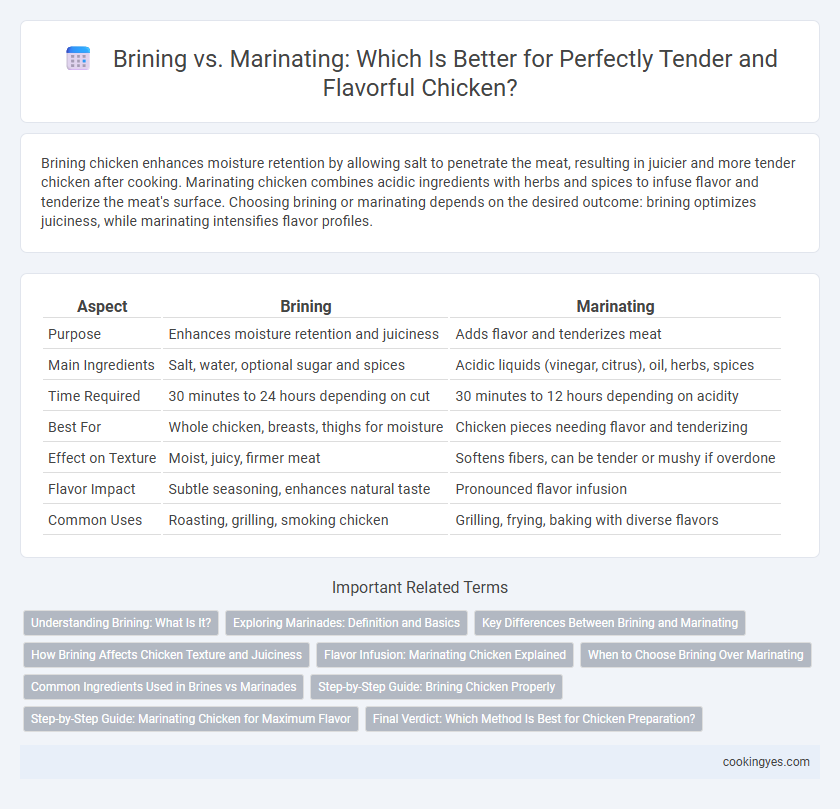Brining chicken enhances moisture retention by allowing salt to penetrate the meat, resulting in juicier and more tender chicken after cooking. Marinating chicken combines acidic ingredients with herbs and spices to infuse flavor and tenderize the meat's surface. Choosing brining or marinating depends on the desired outcome: brining optimizes juiciness, while marinating intensifies flavor profiles.
Table of Comparison
| Aspect | Brining | Marinating |
|---|---|---|
| Purpose | Enhances moisture retention and juiciness | Adds flavor and tenderizes meat |
| Main Ingredients | Salt, water, optional sugar and spices | Acidic liquids (vinegar, citrus), oil, herbs, spices |
| Time Required | 30 minutes to 24 hours depending on cut | 30 minutes to 12 hours depending on acidity |
| Best For | Whole chicken, breasts, thighs for moisture | Chicken pieces needing flavor and tenderizing |
| Effect on Texture | Moist, juicy, firmer meat | Softens fibers, can be tender or mushy if overdone |
| Flavor Impact | Subtle seasoning, enhances natural taste | Pronounced flavor infusion |
| Common Uses | Roasting, grilling, smoking chicken | Grilling, frying, baking with diverse flavors |
Understanding Brining: What Is It?
Brining chicken involves soaking it in a saltwater solution, which enhances moisture retention and tenderness by altering the muscle proteins. This process helps prevent dryness during cooking and intensifies the chicken's natural flavor. Compared to marinating, brining primarily focuses on improving texture and juiciness rather than imparting strong flavors.
Exploring Marinades: Definition and Basics
Marinating chicken involves soaking it in a seasoned liquid mixture composed of acids like vinegar, citrus juice, or yogurt, combined with herbs, spices, and oils to enhance flavor and tenderness. The acidic components break down muscle fibers, allowing deeper infusion of taste and increased juiciness during cooking. Unlike brining, which primarily uses a saltwater solution to increase moisture retention, marinades focus on flavor complexity and subtle texture changes in the chicken.
Key Differences Between Brining and Marinating
Brining involves soaking chicken in a saltwater solution to enhance moisture retention and tenderness, while marinating typically uses acidic ingredients like vinegar or citrus juices to infuse flavor and tenderize the meat. Brining primarily improves juiciness through osmosis, whereas marinating alters the chicken's flavor profile and can impact texture by breaking down proteins. The duration for brining is generally longer, ranging from a few hours to overnight, compared to marinating which usually takes 30 minutes to several hours depending on the marinade composition.
How Brining Affects Chicken Texture and Juiciness
Brining chicken involves soaking it in a saltwater solution, which enhances moisture retention by allowing muscle fibers to absorb and hold water, resulting in a juicier texture. The salt in the brine denatures proteins, causing them to unfold and create a firmer yet tender bite, preventing dryness during cooking. This method significantly improves the succulence and mouthfeel of chicken compared to marinating, which primarily imparts flavor without deeply altering moisture content.
Flavor Infusion: Marinating Chicken Explained
Marinating chicken involves soaking the meat in a seasoned liquid mixture containing acids like vinegar or citrus juice, enzymes, herbs, and spices, which penetrate the muscle fibers to enhance flavor and tenderness. The acidic components in marinades break down proteins, allowing deeper infusion of aromatic ingredients such as garlic, rosemary, and chili, resulting in a complex and well-rounded taste profile. Unlike brining, which primarily improves moisture retention, marinating significantly influences the overall flavor intensity and texture of the chicken before cooking.
When to Choose Brining Over Marinating
Brining is ideal for lean chicken cuts like breasts, as it enhances moisture retention by allowing the meat to absorb a saltwater solution, resulting in juicier and more tender chicken after cooking. Marinating excels when flavor infusion is the primary goal, especially with acidic or oil-based marinades that tenderize and impart complex taste profiles. Choose brining over marinating when the emphasis is on improving texture and moisture rather than solely adding external flavors.
Common Ingredients Used in Brines vs Marinades
Brining chicken typically involves a solution of water, salt, and sugar, often enhanced with aromatics like garlic, peppercorns, and bay leaves to improve moisture retention and flavor penetration. Marinades commonly feature acidic components such as lemon juice, vinegar, or yogurt combined with oil, herbs, and spices to tenderize the meat and add complex taste profiles. Understanding the distinct roles of salt in brines and acids in marinades helps optimize chicken texture and flavor during preparation.
Step-by-Step Guide: Brining Chicken Properly
Brining chicken involves soaking it in a saltwater solution, typically with added sugar and spices, for at least 1 to 4 hours to enhance moisture retention and flavor. Use a ratio of 1/4 cup of kosher salt per quart of water, ensuring the chicken is fully submerged in the brine and refrigerated during the process. Rinse the chicken thoroughly and pat dry before cooking to achieve juicy, tender results.
Step-by-Step Guide: Marinating Chicken for Maximum Flavor
Marinating chicken involves soaking the meat in a seasoned liquid mixture, typically containing acids like lemon juice or vinegar, along with herbs and spices, for at least 30 minutes to several hours to enhance flavor and tenderness. To maximize flavor, start by combining your marinade ingredients, place the chicken in a resealable bag or container, ensuring it is fully coated, then refrigerate and turn occasionally for even absorption. Proper marinating time varies by cut, with boneless pieces requiring less time than bone-in, preventing over-marinating that can cause a mushy texture.
Final Verdict: Which Method Is Best for Chicken Preparation?
Brining enhances chicken by increasing moisture retention and tenderness through salt absorption, while marinating adds distinct flavors and can also tenderize depending on acidic content. For juicy, tender chicken with subtle seasoning, brining is the superior choice, especially for whole birds or thick cuts. Marinating excels when infusing bold flavors is desired, making the best method dependent on whether moisture retention or flavor penetration is the priority.
Brining vs Marinating for chicken preparation Infographic

 cookingyes.com
cookingyes.com